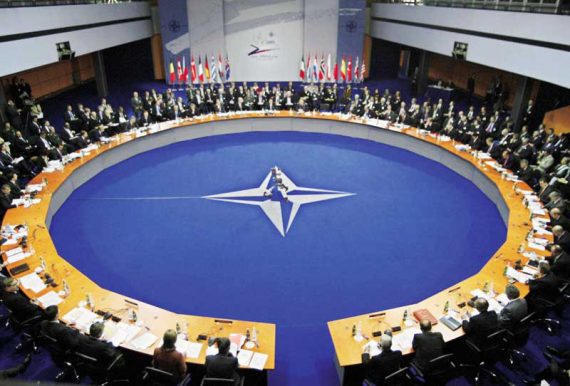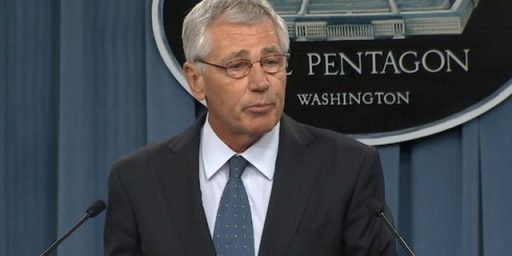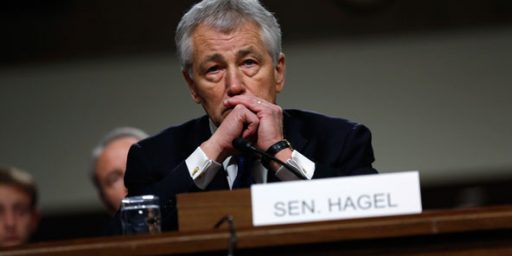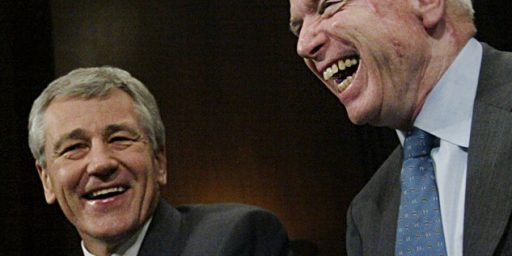Citing Ukraine, Hagel Calls On NATO Allies To Contribute More To Defense
Speaking last week in Europe, Secretary of Defense Chuck Hagel is calling on other members of NATO to meet the promises they made when it comes to defense funding:
(Reuters) – Russia’s actions in Ukraine have shattered the myth of European security in the post-Cold War era and underscored the danger NATO allies have created by failing to meet their defense spending pledges, U.S. Defense Secretary Chuck Hagel said on Friday.
The Pentagon chief, in a speech on the future of the 28-nation alliance, said Russia’s seizure of the Crimean peninsula and other action in the region had “reminded NATO of its founding purpose” and “presented a clarifying moment for the transatlantic alliance.”
He also raised a longstanding U.S. concern about NATO defense spending, noting that American outlays on security are three times that of the other 27 partners combined, even though the U.S. gross domestic product is smaller than their total GDP.
“This lopsided burden threatens NATO’s integrity, cohesion and capability – and ultimately, both European and transatlantic security,” Hagel said in remarks at the Woodrow Wilson International Center in Washington. “We must see renewed financial commitments from all NATO members.”
Only four of the NATO partners met their agreed target of spending 2 percent of GDP on defense in 2013 – Estonia, Greece, Britain and the United States. France and Turkey fell just shy of the 2 percent goal.
Hagel said one of the biggest obstacles to investment in defense was the sense that the prospect of conflict among nations had dissipated with the end of the Cold War.
“Russia’s actions in Ukraine shatter that myth and usher in bracing new realities,” he said. Given Moscow’s actions in Ukraine, NATO in the future “should expect Russia to test our alliance’s purpose, stamina and commitment,” he added.
“We cannot take for granted, even in Europe, that peace is underwritten by the credible deterrent of military power,” the U.S. defense chief said, calling for greater coordination among the allies on defense investments as well as higher levels of spending.
Playing a large role in this, of course, is the fact that the United States has looked toward cutting its own defense spending as the war in Afghanistan winds down, Given the United States’s own domestic spending concerns, the fact that recent events in Eastern Europe suggest a more active role for NATO in the future necessarily means that we’d be looking to our allies to kick some money into the pot. Obviously, some nations are in a position to contribute far more than others, with Germany and the United Kingdom being at the top of the list. At the same time, I can’t help but think that before NATO starts asking for more money for its members it probably ought to figure out what its mission going forward actually will be. Russia’s actions in Ukraine certainly portend the possibility of a more confrontational Eastern Europe than we’ve seen since the fall of the Soviet Union, but it’s unclear exactly how we ought to be responding to that. Spending more money without knowing what you’re going to do with it doesn’t seem to make much sense to me.







The military budget of the US is seven times the military budget of Russia.
The combined military budget of France, Germany, Italy, and the UK (all European members of NATO) is 2.27 times the military budget of Russia.
It’s so obvious that increasing military budgets is the solution here…
I think it bears mentioning that the Baltic NATO members spend less than 2% of GDP on defense each. We spend upwards of 4% of a much larger GDP.
If Russia is a threat to them, why aren’t they spending more on defense? Why not 10% or 20% of GDP?
One might get the feeling that they were freeriders.
@Dave Schuler:
Sure, of those states, only Estonia is spending the stipulated 2% of its GDP on the military budget. But if those countries spent 20% of the GDP on the military budgets, they would have a lot bigger problems than getting attacked by Russia. And if Russia wanted to attack I doubt them spending 2% or 20% would matter.
—-
And to add to my previous comment, the combined military budgets of all European NATO members is 3.3 times the military budget of Russia.
@PJ:
There are historic precedents for small, relatively poor countries deterring larger enemies by being armed to the teeth. I think this is one of those relative priority things. As long as they can get away with being freeriders, they will.
I understand what the Baltic countries get by being NATO members. I don’t understand what we get by their being NATO members. I don’t see that it enhances our security or prestige a bit and I don’t see it advancing any strategic interest.
Maybe its time for another Congress of Vienna to work out spheres of influence before Putin grins while Estonian and German troops form up on one side of Lake Peipus.
Probably mean giving up Ukraine and NATO being a combination buyer’s club/debating society.
@Dave Schuler:
Out of curiosity, which countries?
@Dave Schuler: You cannot spend anything on the military if your economy collapses. Estonia spending 20% of it’s GDP on the military would not be spending that much very long. And besides, 20% of Estonia’s GDP is 4.2 billion Dollar. Would that really make a difference?
@Tran:
Given its territory? I hope so! It’s only 2,000ish square miles bigger than Massachusetts.
@Tillman: But isn’t the opposing force the deciding factor here? They could buy a few more aircraft or tanks, to be destroyed in the initial stage of the Russian invasion. That doesn’t seem like it would be all too useful.
@PJ:
Switzerland for one.
@Tran:
Unless I misunderstand what you’re saying, your point is that Estonia is incapable of defending itself and is wholly dependent on the U. S. for its existence as a country. Fair enough.
Other than its membership in NATO, why are we interested in Estonia’s existence as a country?
@Dave Schuler: Let’s be honest though. That’s as much credible to its mountainous terrain as it is to all its citizens being armed to the teeth. Estonia’s closer to a coastal plain.
@Tran: Building fortifications might help. Also something to stave off air power. I’m not saying they’d win, but a giant build-up relative to GDP would certainly change the Russian calculus on invasion. That’s the idea, isn’t it?
@Tillman:
As you suggest, there’s a cost-benefit calculation. Switzerland is terrain that’s tough to fight on, the Swiss are very heavily armed relative to the size of the country, and their military is trained for the terrain. It’s like a hedgehog. Predators really must want to go after them to attack them.
Historically, there were other components of Switzerland’s defense. Among them were that they provided enough mercenaries to their neighbors that they in a manner of speaking had infiltrated their militaries. Also, as Macchiavelli related, they were known to punish transgressors.
I’d note that Finland did pretty well against the Russians in the 1939-40 Winter war. They did lose, though. Frankly, the Baltics are just too small to defend themselves against Russia. Seems that NATO should have made it mandatory that the countries spend a certain portion of its budget on its defense. Mr. Schuler is right: the Baltics do look like they are freeloading by just spending 2%.
Again, that secondary round of NATO expansion just doesn’t make sense, strategically. In hindsight, we should have negotiated some sort of Finland nuetral status for the Baltics. But here we are.
@stonetools:
2% of GDP is the amount stipulated by NATO, Estonia is spending that, Lithuania (0.8%) and Latvia (1%) aren’t.
On the subject of referring to Estonia as a freeloader, nine Estonians have been killed in Afghanistan, which means that per capita, Estonia (0.68 deaths / 100,000) isn’t that far from the US (0.73 deaths /100,000). Ranked by per capita Estonia is fourth, only behind the UK (0.71 deaths/ 100,000), the US, and Denmark (0.77 deaths / 100,000).
Location, location, location.